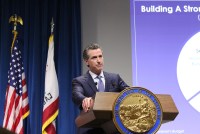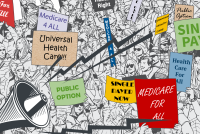Latest KFF Health News Stories
Caen en picada las nuevas inscripciones en Covered California
Las nuevas inscripciones cayeron casi un 24% para los planes de 2019. Algunos expertos dicen que esta baja no es una sorpresa.
New Covered California Sign-Ups Plummet
Even though the number of people renewing their Covered California health plans increased this year, new enrollment plunged by nearly a quarter compared with last year, posting a bigger drop than the federal health insurance exchange, healthcare.gov, which saw a 16 percent decrease. Officials largely blame the elimination of the federal tax penalty for people without insurance.
Providers Walk ‘Fine Line’ Between Informing And Scaring Immigrant Patients
Some doctors and clinics are proactively informing patients about a proposed policy that could jeopardize the legal status of immigrants who use public benefit programs such as Medicaid. Others argue that because this “public charge” proposal isn’t final — and may never be adopted — disseminating too much information could create unnecessary alarm and cause some patients to drop benefits.
Newsom Diverges Sharply From Washington With Health Care Budget
California Gov. Gavin Newsom made health care a priority in his proposed state budget, asking lawmakers to authorize state-funded financial aid for health insurance, impose a penalty on uninsured Californians and expand Medicaid coverage to unauthorized immigrants.
Addiction Rooted In Childhood Trauma, Says Prominent Specialist
Dr. Gabor Maté of British Columbia recently visited Sacramento and laid out his theories in an interview with California Healthline.
Newsom Comes Out Swinging On Day One For Single-Payer, Immigrant Coverage
Just hours into his tenure as California’s new governor, Democrat Gavin Newsom proposed major plans to insure more Californians, including state-funded financial aid for health insurance and a requirement for Californians to have coverage.
No-Go On Drunken Driving: States Deploy Breathalyzers In Cars To Limit Road Deaths
On New Year’s Day, California joined the majority of U.S. states that require people convicted of drunken driving to install ignition-linked breathalyzers in their vehicles. If the devices detect alcohol above a predetermined level, the cars don’t start.
En Route To Congress, California Democrats Hit Wall On ‘Medicare-For-All’
California’s incoming congressional delegation will be the largest in the U.S. House of Representatives to support progressive health care policies such as “Medicare-for-all.” But the political reality of a Republican Senate and president means that they will need to pursue ideas that “aren’t pie in the sky.”
Health Care Industry ‘Pays Tribute’ To California’s Influential Lawmakers
The leaders of California’s legislative health committees who wield power over state health policy have been showered with money from the health care sector, with drug companies, health plans, hospitals and doctors providing nearly 40 percent of their 2017-18 campaign funds.
Feds Say California May Have Spent Nearly $1B On Ineligible Medi-Cal Beneficiaries
The potentially improper payments occurred in 2014 and 2015, when the state says it was under pressure from a massive influx of new applicants due to the Affordable Care Act’s Medicaid expansion.
Feds Join Lawsuit Alleging Sutter Health Padded Revenue With False Patient Data
The whistleblower complaint says that Sutter, one of the largest health systems in the U.S., exaggerated how sick certain Medicare patients were in order to collect higher payments from the government-funded program.
In California, Doctors Accused Of Sexual Misconduct Often Get Second Chances
The state medical board grants probation in more than a third of cases, a KHN analysis found. Even as other institutions adapt to lessons of the #MeToo movement, the board plans no significant changes, saying it has always prioritized discipline for sexual misconduct.
Blue Shield’s Trims To Out-Of-State Coverage Give Some Californians The Blues
To keep costs down, Blue Shield of California next year will scale back on a program allowing members to receive a wide range of care beyond the state’s borders. Customers with individual plans mostly won’t be able to get coverage out of state except for emergencies or other exceptional circumstances.
More Than Half Of California Nursing Homes Balk At Stricter Staffing Rules
Patient advocates say the state’s new staffing regulations are a good start toward better protecting the frail, but the nursing home industry contends they’re too burdensome.
Gun Control Vs. Mental Health Care: Debate After Mass Shootings Obscures Murky Reality
More than half of mass shooters have serious mental health disorders, experts say, but the vast majority of mentally ill people are not violent. Some clinicians suggest strategic interventions, including closing loopholes in background checks to buy firearms and allowing family members to confiscate guns under temporary court orders for relatives at risk of doing harm.
For Wildfire Safety, Only Particular Masks Guard Against Toxic Particulate Matter
As wildfires blaze in Northern and Southern California, millions of people outside of the burn zones are getting exposed to dangerous wildfire smoke. For those donning face masks for protection, only a specific mask will work.
Measure To Cap Dialysis Profits Pummeled After Record Spending By Industry
The dialysis industry raised nearly $111 million in a successful bid to defeat the measure, which also was opposed by hospitals and doctors. The union that sponsored the measure collected about one-sixth that amount.
California’s Top Lawyer Sees Election Win As Mandate To Sustain Trump Resistance
Attorney General Xavier Becerra views his resounding Election Day win as a “clear signal” from voters to continue his work defending the Affordable Care Act and pushing back against the Trump administration.
California Dreamin’? With Newsom’s Win, Single-Payer Unlikely To Follow Anytime Soon
Even though Democrat Gavin Newsom campaigned for single-payer, it’s unlikely that he and other lawmakers will completely overhaul the state’s health care system right away. Instead, they will likely propose incremental steps to provide more Californians with health insurance.
Quick: What’s The Difference Between Medicare-For-All And Single-Payer?
As politicians across the country toss about such health care catchphrases, sometimes interchangeably, many voters say they’re “just confused.”


























